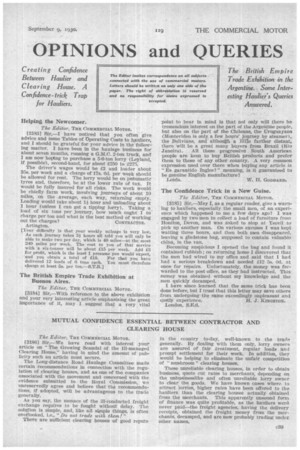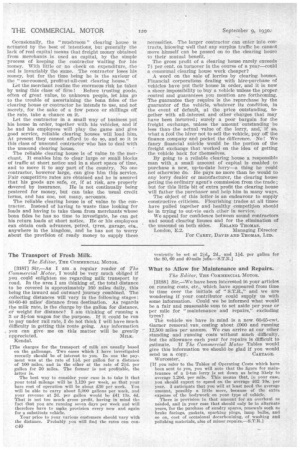MUTUAL CONFIDENCE ESSENTIAL BETWEEN CONTRACTOR AND CLEARING HOUSE The Editor, THE COMMERCIAL MOTOR.
Page 61

Page 62

If you've noticed an error in this article please click here to report it so we can fix it.
[3186] Sir,—We have read with interest your article on "The Growing Scandal of the Ill-managed Clearing House," having in mind the amount of publicity such an article must secure.
The Long-distance Road Haulage Committee made certain recommendations in connection with the regulation of clearing houses, and as one of the companies associated with the movement and concerned with the evidence submitted to the Royal Commission, we unreservedly agree and believe that the recommendations, if adopted, will be advantageous to the trade generally.
• As you say, the menace of the ill-Conducted freight exchange requires to be fought without delay. The solution is simple, and, like all simple things, is often overlooked, i.e., "Do not trade with them!"
There are sufficient clearing houses of good repute in the country to-day, well-known to the trade generally. By dealing with them only, lorry owners are assured of fair treatment, regular loads !and prompt settlement for their work. In addition, they would be helping to eliminate the unfair competition of " mushroom " clearing houses, These unreliable clearing houses, in order to obtain business, quote cut rates to merchants, depending on the uninisinesslike and often unreliable lorry owner i
to clear the goods. We have known cases where. to attract orries, higher rates have been offered to the hauliers than the clearing houses actually obtained from th4 merchants. This apparently unsound form of finance was quite profitable, as the hauliers .wera never paid—the freight agencies, having the delivery receipts, obtained the freight money from the merchants, decamped, and are now probably trading under. other names,
Occasionally, the "mushroom" clearing house is actuated by the best of interitionS, but generally the lack of real capital means that freight money obtained from merchants is used as capital, by the simple process of keeping the contractor waiting for his money. With little or no check on expenditure, the end is invariably the same. The contractor loses his money, but for the time being he is the saviour of the " one-roomed, profit-at-all-cost clearing house."
Let the merchant realize the enormous risk he takes by using this class of firm! Before trusting goods, often of great value, to unknown people, let him go to the trouble of ascertaining the bona fides of the clearing house or contractor he intends to use, and not merely, for the sake of a few pence or shillings off the rate, take a chance on it.
Let the contractor in a small way of business put his house in order, together with his vehicles, and if he and his employees will play the game and give good service, reliable clearing houses will load him. At present they cannot afford to do so, and so it is this class of unsound contractor who his to deal with the unsound clearing house.
The reliable clearing house is of value to the merchant. It enables him to clear large or small blocks of traffic at short notice and in a short space of time, and to move it to any part of the country. No one contractor, however large, can give him this service. Fair competitive rates are obtained and he is assured that his goods are safe, or, if at risk, are properly layered by insurance. He is not continually being pestered for money, but can take, the usual credit terms, and has one, not many, accounts.
The reliable clearing house is of value to the contractor. Instead of having to waste time looking for loads and having to take them from merchants whose bona fides he has no time to investigate, he can get his return loads at short notice. He or his employees can obtain cash advances, petrol, tyres, garage, etc., anywhere in the kingdom, and he has not to worry about the provision of ready money to supply these
necessities. The larger contractor can enter into contracts, knowing Well that any surplus traffic he cannot move himself can he passed on to the clearing house to their mutual benefit.
The gross profit of a clearing house rarely exceeds per cent. on turnover in the course of a year—could a communal clearing house work cheaper?
A word on the sale of lorries by clearing houses. Financial corporations dealing with hire-purchase of vehicles have put their house in order, and it is now a, sheer impossibility to buy a vehicle unless the proper control and guarantees you mention are forthcoming. The guarantee they require is the repurchase by the guarantor of the vehicle, whatever its Condition, in the event of default, at the price outstanding, together with all-interest and other charges that may have been incurred ; surely a poor bargain for the freight exchange, 'unless the amount outstanding be less than the actual -value of the lorry, and, if so, what a fool the hirer not to sell the vehicle, pay offthe finance company and pocket the difference. No! We fancy financial suicide would be the portion of the freight exchange that worked on the idea of getting the vehicle back for themselves.
By going to a reliable clearing house a responsible man with a small amount of capital is enabled to purchase a new, up-to-date lorry—a thing he could not otherwise do. He -pays no more than he would to any lorry dealer or manufacturer, the clearing house getting the ordinary agent's commission from the trade; but for this little bit of extra profit the clearing house will father the purchaser and help him in many ways.
The object of this letter is an endeavour to supply constructive criticism. Flourishing trades at all times have pulled together and healthy competition should be in trying to out-vie each other in service.
We appeal for confidence between sound contractors and sound clearing Houses and for the elimination of the unsound on both sides. EBLAND THOMAS, London, E.2. Managing Director For CAREY, DAVIS AND THOMAS, LTD.
The Transport of Fresh Milk.
The Editor, Tim COMMERCIAL MOTOR.
[3187] Sir,—As I am a regular reader of The Commercial Motor, I would be very much obliged if you could enlighten me regarding milk transport by road, In the area I am thinking of, the total distance to be covered is approximately 160 miles daily, this being the inward and outward journey combined. The collecting distances will vary in the following stages : 80-60-40 miles' distance from destination. As regards the milk rate, is the charge by the gallon for distance, of weight for distance? I am thinking of running a 3 or 31-ton wagon for the purpose. If it could be run to pay under rail rate, I do not think I will have much difficulty in getting this route going. Any information you can give me on this matter will be greatly
appreciated. MILK. Kendal.
[The charges for the transport of milk are usually based on the gallonage. Two cases which I have investigated recently should be of interest to you. In one the payment was at the rate of 1Ad. per gallon for a distance of 100 miles, and in the other at the rate of 2id. per gallon for 50 miles. The former is net profitable, the latter is.
The best way to consider your case is to take it that your total mileage will be 1,120 per week, so that your bare cost of operation will be about £30 per week. You will be able to carry about 5,000 gallons per week, and your revenue at 2d. per gallon would be £41 13s. 4d. That is not too much gross profit, having in mind the fact that you are running seven days per week and will therefore have to 'Nuke provision every now and again for a substitute vehicle.
Your price to your various customers should vary with the distance. Probably you will find the rates can conc40 veniently be set at 21d, 2d., and lid. per gallon for the 80, 60 and 40-mile What to Allow for Maintenance and Repairs.
• The Editor, THE, COMMERCIAL MOTOR.
[3188] Sir,—We have been interested in your articles on running costs, etc., which have appeared from time to time over the initials of " S.T.R.," and we are wondering if your contributor could supply us with some information. Could we be informed what would be a. fair and reasonable sum to set aside per year or per mile for "maintenance and repairs," excluding tyres? The vehicle we have in mind is a new 60-65-cwt. Garner removal van, costing about 1900 and running 12,500 miles per annum. We can arrive at our other standing and running costs without much difficulty, but the allowance each year for repairs is difficult to
estimate. If The Commercial Motor Tables would give this information we should -be glad if you would send us a copy. CARTAGE.
Worcester.. •
[If you refer to the Tables of Operating Costs which have been sent to you you will note that the figure for main tenance of a :3-ton lorry is set down as being likely to average 1,20d. per mile. This means that, in your case, you should expect to spend on the average £62 10s. per
year. I anticipate that you will at least need the average amount, 'possibly a little more, because of the extra .expense of the bodywork on your type of vehicle.
,There is provision in that amount for an overhaul as needed, and in your ease that should only be in alternate
years, for the purchase of sundry spares, renewals such as brake facings gaskets, sparking plugs, lamp bulbs, andso on, cost Of occasional decarbonizing, of washing and polishing materials, also of minor repairs.-----S.'37.R.]












































































































